Rebels in the city of #Aleppo say 40 have been killed in a hospital strike by the Syrian Government ! http://www.cnn.com/2012/11/21/world/meast/syria-civil-war/?hpt=hp_t1 … #Syria
9:51 PM - 21 Nov 12 · Details
Rebels say Syria hospital strike kills 40
From Ivan Watson, CNN
updated 8:45 PM EST, Wed November 21, 2012

Civilians gaze at the ruins of a hospital reportedly struck Wednesday by Syrian government forces in the city of Aleppo.
STORY HIGHLIGHTS
- NEW: Rebels say Syrian airstrike hits Aleppo hospital; 40 dead
- Turkey concerned over "threats and risks" from the Syrian crisis
- NATO says the missiles would demonstrate solidarity in the alliance
- Turkey and Syria share a border of more than 500 miles
Istanbul, Turkey (CNN) -- Syrian rebels accused government forces of bombing a hospital in the besieged city of Aleppo late Wednesday, killing at least 40 people as the conflict there ground on.
Ralib al-Omar, a leader of the Yusif al-Asma rebel group, said the attack targeted the Dar al-Shifa Hospital and that the dead included two nurses. The Local Coordination Committees of Syria, a network of opposition activists, said a doctor was among the dead as well -- one of 108 people the group said were killed across the country on Wednesday.
Dar al-Shifa is one of the main sources of medical help for people in Syria's commercial hub. In video posted by opposition activists, the blast appeared to have hit the hospital's often-crowded front lobby.
Aleppo has been the scene of some of the heaviest fighting of the 20-month-old Syrian conflict since August, and an artillery shell had hit the hospital's maternity ward earlier this year.
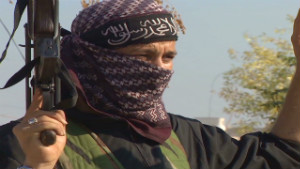 Ethnic clashes erupt in northern Syria
Ethnic clashes erupt in northern Syria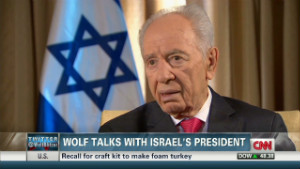 Peres: Iran is competing with Egypt
Peres: Iran is competing with Egypt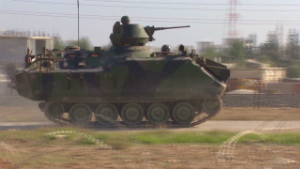 Turkey wants missile system along border
Turkey wants missile system along border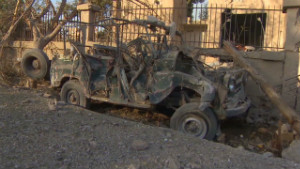 Inside a Syrian border town
Inside a Syrian border town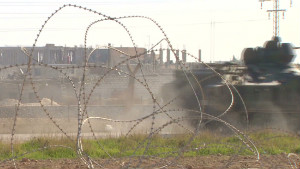 Lull in battle near Turkey-Syria border
Lull in battle near Turkey-Syria border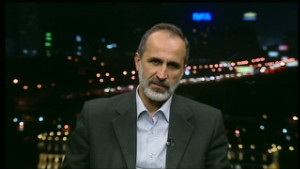 Syria's new opposition leader
Syria's new opposition leader
An estimated 37,000-plus people have been killed since protests broke out against Syrian President Bashar al-Assad in March 2011. Al-Assad responded by turning the army and police on the demonstrations, resulting in a civil war that has so far killed more than 37,000 people, according to the opposition Center for Documentation of Violations in Syria.
Most of those are civilians, though about 3,000 of the dead are government troops, the center reported last week. The government-owned Syrian Arab News Agency reported a series of clashes between security forces and armed terrorist groups -- its euphemism for opposition fighters -- and intense fighting near the Syrian-Turkish border in recent weeks has pitted loyalist Syrian forces and fighters from the rebel Free Syrian Army.
CNN cannot confirm claims by the government or the opposition because of government restrictions that prevent journalists from reporting freely within Syria.
In a sign of a potential escalation of the conflict, Turkey asked its NATO allies for Patriot missiles Wednesday to bolster its air defenses against its southern neighbor. A letter to NATO included the "formal request" that the alliance send "air defense elements," according to a Turkish government statement that cited "the threats and risks posed by the continuing crisis in Syria to our national security."
The statement added that the NATO Council would convene "shortly" to consider the matter. NATO Secretary-General Anders Fogh Rasmussen said in a Twitter post that the request would be considered without delay.
In a statement on Wednesday, Rasmussen said the letter from Turkey requested Patriot missiles that would "contribute to the de-escalation of the crisis along NATO's south-eastern border" and serve as "a concrete demonstration of alliance solidarity and resolve."
Rasmussen's statement said three NATO countries have available Patriot missiles -- Germany, the Netherlands and the United States -- and it would be up to them to decide if they can deploy them and for how long.
A NATO team will visit Turkey next week to survey possible deployment sites for the Patriot missiles, Rasmussen's statement said.
Sources told CNN that Germany would be the likely source for a deployment. German Chancellor Angela Merkel said Wednesday that any decision involving her country would need the approval of Parliament.
In Turkey, Foreign Ministry spokesman Selcuk Unal said NATO forces under the command of the alliance would come to Turkey as part of the missile deployment. He noted that NATO-supplied Patriot missiles previously were deployed in Turkey in 1991 and 2003.
"It's not as if they are going to come tomorrow to be deployed," Unal said, calling the move a precautionary measure that will deter escalation along the Syrian border.
International and Turkish media reported earlier this month that Turkey planned to ask NATO to station Patriot missiles along the border with Syria, but Prime Minister Recep Tayyip Erdogan denied it at the time.








